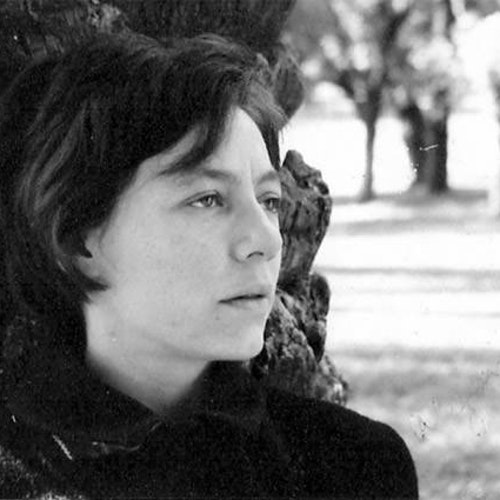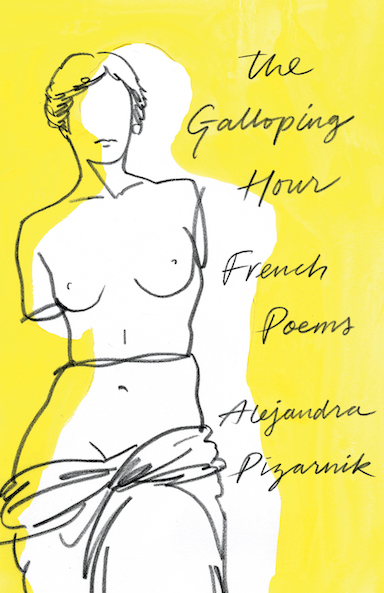Once again, someone falls in their first falling — fall of the two bodies, of the two eyes, of four green eyes or eight green eyes if we count those born in the mirror (at midnight, in the purest fear, in loss), you haven’t been able to recognize the voice of your dull silence, to behold the earthly messages scrawled in the middle of one mad state, when the body is a glass and from ourselves and from the other we drink some sort of impossible water.
Desire needlessly spills on me a cursed liqueur. For my thirsting thirst, what can the promise of contact with your eyes do? I speak of something not in this world. I speak of someone whose purpose is elsewhere.
And I was naked in memory of the white night. Drunk, and I made love all night, just like a sick dog.
Sometimes we suffer too much reality in the space of a single night. We get undressed, we’re horrified. We’re aware the mirror sounds like a watch, the mirror from which your cry will pour out, your laceration.
Night opens itself only once. It’s enough. You see. You’ve seen. Fear of being two in the mirror, and suddenly we’re four. We cry, we sob, my fear, my joy more horrible than my fear, my obscene words, my words which are keys locking me into a mirror, with you, but ever alone. I know the nature of night. We’ve fallen so completely into jaws which couldn’t fathom this sacrifice, this condemnation of my seeing eyes. I speak of a discovery: felt the I in sex, sex in the I. I speak of burying everyday fear to secure the fear of an instant. The abyss of absence. But who’ll say: don’t cry at night? Because madness is a lie too. Like night. Like death.
Sex, Night
Feature Date
- May 5, 2019
Series
- Translation
Selected By
Share This Poem
Print This Poem
”Sex, Night” by Alejandra Pizarnik, from THE GALLOPING HOUR, copyright © 2018 by Myriam Pizarnik de Nesis, copyright © 2018 by Patricio Ferrari, copyright © 2018 by Patricio Ferrari and Forrest Gander. Use by permission of New Directions Publishing Corp.

One of the most significant contributors to twentieth-century Argentine poetry, Alejandra Pizarnik made a name for herself through her dark themes and diction. Heavily influenced by Rimbaud and Artaud, Pizarnik believed that suffering was intrinsic to the creation of great poetry. This concession to misery was apparent in her work as her writing was often filled with themes of solitude, estrangement, madness, and death—yet also included moments of tenderness. During her short lifetime she wrote seven books of poetry and one book of prose, as well as numerous translations, short stories, essays, and drawings. In 1968 she was awarded a Guggenheim Fellowship and later in 1971 she received a Fulbright Scholarship. Pizarnik struggled with depression and ended her life in 1972.
![Patricio Ferrari [Photo by Graciela S. Guglielmone].](https://training.poems.com/wp-content/uploads/2019/04/Patricio-Ferrari-Photo-by-Graciela-S.-Guglielmone.-.jpg)
Graciela S. Guglielmone
Argentinian-born Patricio Ferrari has translated poetry from French (Alejandra Pizarnik), Portuguese (Fernando Pessoa, António Osório), English (Frank Stanford, Laynie Browne), and Hindi (Vidrohi). A polyglot, his work as a poet, editor, and translator bridges a life between languages. Recently he edited and co-translated (with Forrest Gander) The Galloping Hour: French Poems by Alejandra Pizarnik (New Directions, 2018). Ferrari resides in New York City and teaches at Rutgers University, while serving as Managing Director of San Patricio Language Institute—a school in the Greater Buenos Aires his mother founded in 1971.
Forrest Gander was born in the Mojave Desert and grew up, for the most part, in Virginia. Trenchant periods of his life were spent in San Francisco, Dolores Hidalgo (Mexico), and Eureka Springs, Arkansas. With degrees in both geology and English literature, Gander is the author of numerous books of poetry, translation, fiction, and essays. He’s the A.K. Seaver Professor of Literary Arts and Comparative Literature at Brown University. A U.S. Artists Rockefeller fellow, Gander has been recipient of grants from the NEA, the Guggenheim, Howard, Witter Bynner and Whiting foundations. His 2011 collection Core Samples from the World was an NBCC and Pulitzer Prize finalist for poetry, and his 2018 collection Be With won the Pulitzer Prize for poetry and was longlisted for the National Book Award.

New York City, New York
"As this slender new collection demonstrates, Pizarnik’s commitment to poetry started early and consumed her life. Whether in Spanish or in French, in Buenos Aires or in Paris, her voice remains that of the eternal émigré who searched for a home but failed to find it. Pizarnik wrote the way she lived: in a state of restless longing."
—Nathan Scott McNamara, Poetry Foundation
"To read Pizarnik is to inhabit her melancholic world, a world of recursive, enabling lines, where ‘my language is the priestess."
—Nick Ripatrazone, The Millions
"Each of Pizarnik’s poems is the hub of an enormous wheel."
—Julio Cortázar
Poetry Daily Depends on You
With your support, we make reading the best contemporary poetry a treasured daily experience. Consider a contribution today.



